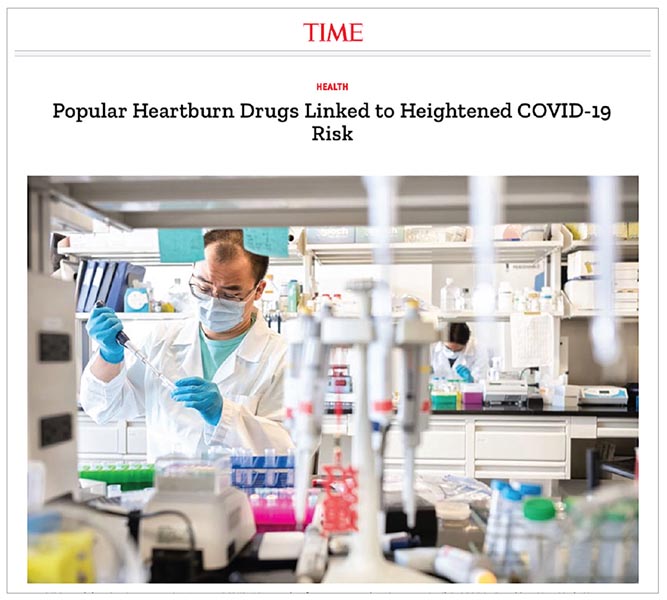Can medication help control GERD?

“Unfortunately, we don’t have any FDA-approved medications that work on the valve,” says Scott Gabbard, a gastroenterologist at the Cleveland Clinic.
Gabbard is referring to a valve called the lower-esophageal sphincter, or LES, which sits between the esophagus and stomach. If the LES relaxes when it's not supposed to, the stomach's contents (including stomach acid) can reflux back into the esophagus.
“Our medicines either neutralize acid or decrease acid production,” Gabbard explains. “So you still have things refluxing up. But if there’s less acid in it, it’s not damaging the esophagus.”
Medications for GERD
■ Antacids like Tums, Alka-Seltzer, Mylanta, and Rolaids neutralize acid in the esophagus. They work quickly, but don’t last long, so they’re best for treating mild, occasional heartburn. (Alka-Seltzer tablets have roughly 600 to 1,200 milligrams of sodium per dose, so consider other antacids instead.)
■ Histamine-receptor antagonists (H2RAs) like Pepcid and Tagamet make the stomach produce less acid, and they last longer than antacids. H2RAs also work more quickly than proton pump inhibitors.
“But they can stop working after two weeks or less,” says Gabbard. “So they may be better for short-term use.”
In April, the Food and Drug Administration asked companies to stop selling the H2RA drug ranitidine (also known as Zantac), and advised consumers to throw out any unused ranitidine.
Tests found that levels of a contaminant in ranitidine called NDMA increase over time and at higher-than-room temperatures. NDMA is thought to be a human carcinogen.
But if you’ve been taking ranitidine, don’t panic.
“A study presented at a conference this year looked at health records from 65 million patients,” says Gabbard. “It found no link between ranitidine use and cancer compared with people who took another H2RA.” Though the study hasn’t been published yet, its results are reassuring.
■ Proton pump inhibitors (PPIs) like Prilosec, Prevacid, and Nexium are the most potent acid blockers on the market. They not only treat symptoms like heartburn and regurgitation but also heal inflammation in the esophagus. And they may trim the odds that Barrett’s esophagus progresses to cancer.
PPI side effects?
What about studies that found a slightly greater risk of kidney disease, dementia, and bone fractures in people who take PPIs?
“The problem is that those studies were observational, so there were many factors you can’t control for,” says Gabbard.
“Take 1,000 people on a PPI compared to 1,000 who aren’t, and the people on PPIs are overall in worse health. They have a worse diet, they’re more likely to have obesity, and so on.”
Researchers try to control for weight and other possible “confounders,” but they can’t eliminate them all.
“So you may conclude that PPIs cause, say, kidney disease when something else is responsible,” says Joel Rubenstein, research scientist at the Veterans Affairs Center for Clinical Management Research and director of the Barrett’s Esophagus Program at the University of Michigan Medical School. “The way to fix that problem is with a randomized controlled trial.”
In a recent trial, researchers randomly assigned roughly 17,500 people to take a PPI or a placebo every day. After three years, the PPI takers were no more likely than the placebo takers to have broken a bone or be diagnosed with pneumonia, chronic kidney disease, dementia, or a handful of other health problems.
That’s reassuring to Rubenstein. “It is possible that PPIs have very weak effects on those outcomes, but I don’t think we are ever going to have a larger trial,” he says.
And for many people, the benefits far outweigh a small, unproven risk, says Gabbard. “Some patients, like those with ulcers and Barrett’s esophagus, may need to be on PPIs for life.”
The trial did find a slightly higher risk of gastrointestinal infection in PPI takers than in placebo takers.
“The main reason we have acid in our stomach is to kill the microorganisms that we ingest,” Rubenstein explains. “So decreased stomach acid may predispose a person to contract a GI infection.”
PPIs and Covid-19?
Could that explain the results of an online survey of roughly 53,000 Americans who reported having symptoms like abdominal pain, heartburn, or regurgitation?
“Those taking a PPI once daily were roughly twice as likely to report having a positive Covid-19 test,” says Rubenstein. “And those who were taking twice daily PPIs were roughly four times more likely to report a positive Covid-19 test.”

“The study was observational, so it can’t prove that PPIs increase your risk of getting Covid-19,” he cautions. And with an online survey, researchers can’t confirm what people report.
While Rubenstein isn’t ignoring the results, “I don’t think they’re a reason for people to just stop taking their PPIs. It’s only one study.”
Rubenstein's bottom line: "Patients should make sure that they have a good reason for taking a PPI. They are wonderfully effective drugs, especially for people with Barrett’s esophagus. But they are overused. If you don’t have Barrett’s, you can try stopping the PPI or using an H2 blocker, which is less potent. If your symptoms go away, you don’t need to be on the PPI.”
Photos: neirfy/stock.adobe.com.
Tags
Topics
The latest on preventing disease
Don’t let these 7 exercise myths fool you
Physical Activity

Cucumbers recalled due to Salmonella outbreak
Food Safety

A snapshot of the latest research on diet, exercise, and more
Preventing Disease

Pop Quiz!
Preventing Disease

Lower your blood pressure with diet and exercise
Physical Activity


